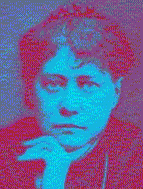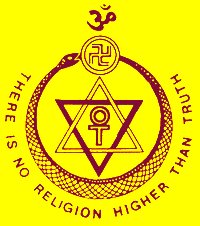The Key to Theosophy

_______________________
The Key to Theosophy
By
Has God the Right to Forgive?
A. To the
Doctrine of Atonement; I allude to that dangerous dogma in which you believe,
and which teaches us that no matter how enormous our crimes against the laws of
God and of man, we have but to believe in the self-sacrifice of Jesus for the
salvation of mankind, and his blood will wash out every stain. It is twenty
years that I preach against it, and I may now draw your attention to a
paragraph from
God's mercy
is boundless and unfathomable. It is impossible to conceive of a human sin so
damnable that the price paid in advance for the redemption of the sinner would
not wipe it out if a thousandfold worse. And furthermore, it is never too late
to repent. Though the offender wait until the last minute of the last hour of
the last day of his mortal life, before his blanched lips utter the confession
of faith, he may go to Paradise; the dying thief did it, and so may all others
as vile. These are the assumptions of the Church, and of the Clergy;
assumptions banged at the heads of your countrymen by England's favorite
preachers, right in the "light of the nineteenth century," …-this
most paradoxical age of all. Now to what does it lead?
Q. Does it
not make the Christian happier than the Buddhist or Brahmin?
A. No; not
the educated man, at any rate, since the majority of these have long since
virtually lost all belief in this cruel dogma. But it leads those who still
believe in it more easily to the threshold of every conceivable crime, than any
other I know of. Let me quote to you once more:
If we step
outside the little circle of creed and consider the universe as a whole
balanced by the exquisite adjustment of parts, how all sound logic, how the
faintest glimmering sense of Justice, revolts against this Vicarious Atonement!
If the criminal sinned only against himself, and wronged no one but himself; if
by sincere repentance he could cause the obliteration of past events, not only
from the memory of man, but also from that imperishable record, which no
deity-not even the most Supreme of the Supreme-can cause to disappear, then
this dogma might not be incomprehensible. But to maintain that one may wrong
his fellowman, kill, disturb the equilibrium of society and the natural order
of things, and then-through cowardice, hope, or compulsion, it matters not-be
forgiven by believing that the spilling of one blood washes out the other blood
spilt-this is preposterous!
Can the
resultsof a crime be obliterated even though the crime itself should be
pardoned? The effects of a cause are never limited to the boundaries of the
cause, nor can the results of crime be confined to the offender and his victim.
Every good as
well as evil action has its effects, as palpably as the stone flung into calm
water. The simile is trite, but it is the best ever conceived, so let us use
it. The eddying circles are greater and swifter as the disturbing object is
greater or smaller, but the smallest pebble, nay, the tiniest speck, makes its
ripples. And this disturbance is not alone visible and on the surface. Below,
unseen, in every direction-outward and downward-drop pushes drop until the
sides and bottom are touched by the force. More, the air above the water is
agitated, and this
disturbance
passes, as the physicists tell us, from stratum to stratum out into space
forever and ever; an impulse has been given to matter, and that is never lost,
can never be recalled! …
So with
crime, and so with its opposite. The action may be instantaneous, the effects
are eternal. When, after the stone is once flung into the pond, we can recall
it to the hand, roll back the ripples, obliterate the force expended, restore
the etheric waves to their previous state of non-being, and wipe out every
trace of the act of throwing the missile, so that Time's record shall not show
that it ever happened, then, thenwe may patiently hear Christians argue for the
efficacy of this Atonement,-and cease to believe in Karmic Law. As it now
stands, we call upon the whole world to decide, which of our two doctrines is
the most appreciative of deific justice, and which is more reasonable, even on
simple human evidence and logic.
Q. Yet
millions believe in the Christian dogma and are happy.
A. Pure sentimentalism
overpowering their thinking faculties, which no true philanthropist or Altruist
will ever accept. It is not even a dream of selfishness, but a nightmare of the
human intellect. Look where it leads to, and tell me the name of that pagan country
where crimes are more easily committed or more numerous than in Christian
lands. Look at the long and ghastly annual records of crimes committed in
European countries; and behold Protestant and Biblical
Q. The
ultimate destiny of man, then, is not a Heaven presided over by God, but the
gradual transformation of matter into its primordial element, Spirit?
A. It is to
that final goal to which all tends in nature.
Q. Do not
some of you regard this association or "fall of spirit into matter"
as evil, and rebirth as a sorrow?
A. Some do,
and therefore strive to shorten their period of probation on earth. It is not
an unmixed evil, however, since it ensures the experience upon which we mount
to knowledge and wisdom. I mean that experience which teaches that the needs of
our spiritual nature can never be met by other than spiritual happiness. As
long as we are in the body, we are subjected to pain, suffering and all the
disappointing incidents occurring during life. Therefore, and to palliate this,
we finally acquire knowledge which alone can afford us relief and hope of a
better future.
__________________________

Find answers to more questions
with these Theosophy links
Dave’s
Streetwise Theosophy Boards
The Theosophy Website that
Welcomes Absolute Beginners
If you run a Theosophy Study Group,
please feel free
to make use of the material on this
Website
The Most Basic Theosophy
Website in the Universe
A quick overview of Theosophy
and the Theosophical Society
If you run a Theosophy Study Group you
can use this as an introductory handout.

Cardiff Theosophical Society meetings
are informal
and there’s always a cup of tea afterwards
The
Cardiff Theosophical Society Website
The
National Wales Theosophy Website
This is for
everybody not just people in Wales
Theosophy Cardiff’s Instant Guide
General pages
about Wales, Welsh History
and The History
of Theosophy in Wales
Independent Theosophy Blog
One liners and quick explanations
About aspects of Theosophy
H P Blavatsky is usually the only
Theosophist that most people have
ever
heard of. Let’s put that right
Lentil burgers, a
thousand press ups before breakfast and
the daily 25 mile
run may put it off for a while but death
seems to get most
of us in the end. We are pleased to
present for your
consideration, a definitive work on the
subject by a
Student of Katherine Tingley entitled
An
Independent Theosophical Republic
Links to Free Online Theosophy
Study Resources; Courses, Writings,
No
Aardvarks were harmed in the
The Spiritual Home of Urban Theosophy
The Earth Base for Evolutionary Theosophy
Classic Introductory
Theosophy Text
A Text Book of Theosophy By C
What Theosophy Is From the Absolute to Man
The Formation of a Solar System The Evolution of Life
The Constitution of Man After Death Reincarnation
The Purpose of Life The Planetary Chains
The Result of Theosophical Study
An Outstanding
Introduction to Theosophy
By a student of
Katherine Tingley
Elementary Theosophy Who is the Man? Body and Soul
Body, Soul and Spirit Reincarnation Karma
Preface
Theosophy and the Masters General Principles
The Earth Chain Body and Astral Body Kama – Desire
Manas Of Reincarnation Reincarnation Continued
Karma Kama Loka
Devachan
Cycles
Arguments Supporting Reincarnation
Differentiation Of Species Missing Links
Psychic Laws, Forces, and Phenomena
Psychic Phenomena and Spiritualism
Quick Explanations with Links to More
Detailed Info
What is Theosophy ? Theosophy Defined (More Detail)
Three Fundamental Propositions Key Concepts of Theosophy
Cosmogenesis
Anthropogenesis
Root Races
Karma
Ascended Masters After Death States Reincarnation
The Seven Principles of Man Helena Petrovna Blavatsky
Colonel Henry Steel Olcott William Quan Judge
The Start of the Theosophical Society Theosophical Society Presidents
History of the Theosophical Society Glossaries of Theosophical Terms
History of the Theosophical Society in Wales
The Three Objectives of the Theosophical Society
Explanation of the Theosophical Society Emblem
Karma Fundamental Principles Laws: Natural and Man-Made The Law of Laws
The Eternal Now
Succession
Causation The Laws of Nature A Lesson of The Law
Karma Does Not Crush Apply This Law
Man in The Three Worlds Understand The Truth
Man and His Surroundings The Three Fates
The Pair of Triplets Thought, The Builder
Practical Meditation Will and Desire
The Mastery of Desire Two Other Points
The Third Thread Perfect Justice
Our Environment
Our Kith and Kin Our Nation
The Light for a Good Man Knowledge of Law The Opposing Schools
The More Modern View Self-Examination Out of the Past
Old Friendships
We Grow By Giving Collective Karma Family Karma
National Karma
India’s Karma
National Disasters
Try these if you are looking
for a
local Theosophy Group or Centre
UK Listing of Theosophical Groups